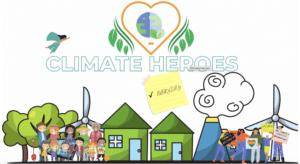(This is an updated version of an article by Mia Bruce first published by Ducky.eco)
It’s that time of the year again. During the Christmas holidays, we might all have enjoyed a bit too much food, prompting us to start thinking about getting that gym membership re-activated, eating ‘clean’ and dusting the old juicer as soon as January hits. I know I am!
That’s why I’m writing down a couple of resolutions for the new year to reflect on the year that has passed and setting myself some goals for the next 12 months.
Here are a few suggestions from my own resolutions for how you can make small changes to your daily routines in the new year:
You’ll be surprised how these small changes make your habits more sustainable, how they save you money, and what a difference they make to the planet.
I also have a few ideas on how you can 1) challenge your friends, or 2) invite your work colleagues, to do their bit in the fight against climate change.
1. Speak Up!
Using your voice is your most powerful climate action.
When you speak up about climate action, you’re not just expressing your concerns; you’re also inspiring others to join the conversation. The more people talk about climate issues, the more likely it is that the message will reach a wider audience, including policymakers and influential figures who can make a big difference.
Additionally, speaking up fosters a sense of collective responsibility. It builds a community of individuals who share common concerns. By speaking up you become a change agent, serving as a catalyst for change: Your voice helps to raise awareness, mobilise your peers, and influence decision-makers to prioritise and implement sustainable practices.
2. Leave your car
We have all heard this one before. When you choose to walk or bike (or roller blade) instead, you’re not only benefitting the environment, but you’re also working towards your resolution to do more exercise!
3. Eat more plant based foods
You don’t need to go on a full vegan diet in order to eat more sustainably. Just reducing your intake of meat and dairy products can make a big difference. How about starting with “meatless Mondays” or challenge yourself to have one meat-free meal a day? As you learn more about cooking and eating delicious plant based meals, it will become much easier to choose plant-based options.
4. Bring your own shopping bags
One of the easiest habits to adopt to easily reduce your plastic consumption. Always keep an extra bag or two in you handbag or backpack, and say ‘no, thank you’ to plastic bags the next time you go shopping.
5. Buy less
All CO2 emissions are a result of the choices you and I make every day. The more new stuff we buy, the more new stuff will be produced, and the more emissions we are letting out into the air. Before buying a new item, ask yourself if you really need it, if you instead could repair or up-cycle something you already own, or if you can buy second-hand. If you still need to purchase something brand new, perhaps it would be a good idea to buy high quality so it will last a long time.
6. Bring a reusable coffee mug
In a report released by the Environmental Audit Committee in January 2018, it was reported that coffee drinkers in the UK throw away 2.5 billion disposable coffee cups every year, and less than 1 per cent are recycled! Investing in a reusable coffee mug means you will be saving the planet another paper cup every time you need your coffee fix! Just make sure you use your cup a couple of times before washing it 😉
7. Buy fewer pre-packed products
Another great way to reduce your waste. Choose products that are loose instead of pre-packed. Reducing your consumption of items such as sweets and crisps is also a way to reduce waste.
8. Choose local
Buying food that has been produced locally means the items you purchase haven’t travelled as far as imported food – and therefore have a lower carbon footprint. You could also look at planting some of your own herbs or vegetables if you have some free space on a windowsill or patio. Doesn’t get any more local than that!
9. LED up your life
Not only do LED light bulbs use at least 75% less energy than regular light bulbs, they can last you up to 25 years! Sure, they cost more than traditional light bulbs, but this is clear investment that will benefit your electricity bill and wallet in the long run, as well as the planet.
10. Say ‘no’ to plastic straws
Another simple way to reduce your plastic consumption to wrap up this list! The EU has banned single-use plastics and more and more people are already using reusable straws made from bamboo, metal or even glass rather than plastic, but the easiest way to live up to this resolution is to drink straight from the cup!
And there you have it, 10 ways to make the new year a bit more sustainable.
If you want to challenge your colleagues to join you in making more sustainable choices in 2026, get in touch with us for more suggestions.
In the meantime: best of luck!


